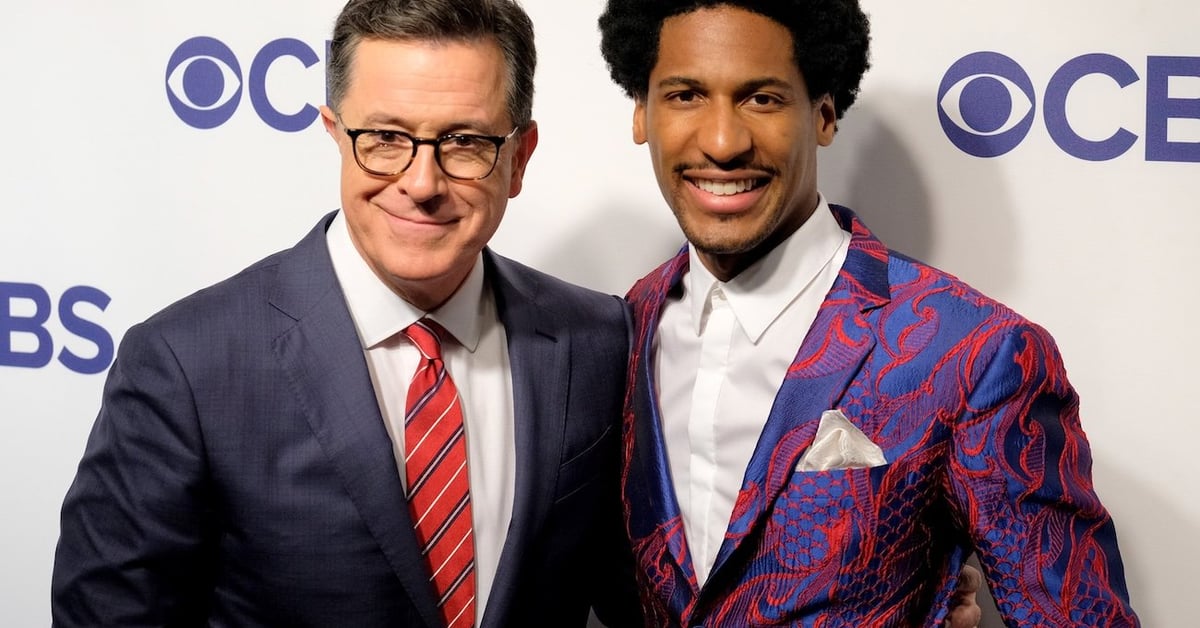CBS’s decision to end The Late Show with Stephen Colbert in 2026, officially blamed on budget cuts, has sparked outrage and suspicion as Jon Batiste’s warning about “big money” silencing bold voices fuels fears that Colbert’s fearless satire was simply too much for the network to tolerate.

When CBS confirmed last week that The Late Show with Stephen Colbert would officially come to an end in 2026, the announcement was framed as a routine decision.
Executives insisted it was “nothing personal,” attributing the move to broader “budget cuts” in an evolving media landscape.
But within minutes of the news breaking, the internet erupted with speculation, skepticism, and outright outrage.
Fans, critics, and industry insiders began asking the same question: was Colbert’s relentless political satire too much for CBS to handle?
Adding fuel to the fire was Jon Batiste, the Grammy-winning musician and longtime bandleader who shared the stage with Colbert for seven years before leaving the show in 2022 to pursue his own projects.
Batiste, who has rarely spoken publicly about the network, didn’t mince words when asked about the decision.
In an interview following the announcement, he cautioned that in today’s television environment, “big money” often determines “who gets a platform — and who gets silenced.”
Coming from someone who lived through the show’s rise and peak alongside Colbert, the comment landed with the force of a thunderclap.

Batiste’s remarks quickly went viral, with many interpreting them as confirmation of what some viewers had long suspected: that Colbert’s sharp-edged comedy, particularly his fearless critiques of political figures and corporate power, had made CBS executives uncomfortable.
During the Trump administration, Colbert’s biting monologues routinely topped the ratings, making The Late Show the most-watched late-night program for five consecutive years.
Yet the same segments that energized audiences also sparked backlash from advertisers and conservative critics, putting CBS in the uncomfortable position of profiting from content that simultaneously drew controversy.
Colbert himself has not publicly commented in detail on the network’s decision, though during a recent taping he joked with the audience, “They told me I was too expensive — and I said, ‘What, are you charging by the laugh now?’” The quip drew laughter in the room, but it did little to quiet speculation about whether CBS had grown weary of Colbert’s boldness.
Industry observers note that Colbert’s departure marks not just the end of a show, but the end of an era.
Since taking over from David Letterman in 2015, Colbert transformed The Late Show into a ratings powerhouse and a cultural force, blending traditional celebrity interviews with unflinching political commentary.
His team was recognized with multiple Emmy Awards, and his work during moments of national crisis — from the COVID-19 pandemic to the January 6 Capitol attack — cemented his reputation as one of late-night’s most fearless voices.

Jon Stewart, another titan of political comedy and a longtime friend of Colbert, has already weighed in indirectly.
Just weeks before CBS’s announcement, Stewart stunned audiences with an on-air protest that many interpreted as a warning to networks against stifling dissenting voices.
David Letterman, too, recently commented at a film festival that he was “troubled” by the increasing role of corporate influence in shaping what Americans see on their screens.
Against that backdrop, Colbert’s planned exit in 2026 looks less like a natural retirement and more like the latest casualty in a growing struggle between creative independence and corporate control.
CBS, for its part, has offered only vague explanations.
Network spokespeople point to shrinking budgets, changing viewer habits, and the rise of streaming platforms as reasons for the decision.
“This is about adapting to a new era of media,” one executive said, insisting the move was “nothing personal.”
But for millions of Colbert’s loyal fans, that explanation rings hollow.

The timing, the vagueness, and now Batiste’s pointed comments have all combined to create the impression that something larger is at play.
As the countdown to 2026 begins, the debate shows no signs of cooling.
Media analysts warn that Colbert’s departure could become the most hotly debated farewell in late-night history, rivaling even Letterman’s exit.
Petitions have already begun circulating online demanding CBS reconsider, while social media platforms are awash with clips of Colbert’s most scathing monologues — reminders of the fearless satire that may have ultimately led to his undoing.
One thing, however, is certain: Jon Batiste’s decision to speak out has ensured that this will not be remembered as a quiet ending.
His words have amplified the growing suspicion that the loudest, boldest voices in television are being slowly muted by corporate influence.
And as CBS remains silent on the deeper reasons behind its decision, the demand for answers is only growing louder.
Whether Colbert’s departure is remembered as the natural close of a remarkable chapter or as a symbol of late-night television’s decline will depend on how the next two years unfold.
For now, viewers remain glued not just to Colbert’s nightly broadcasts, but to the drama unfolding behind the scenes — a drama that, in the end, may prove more explosive than anything scripted for television.